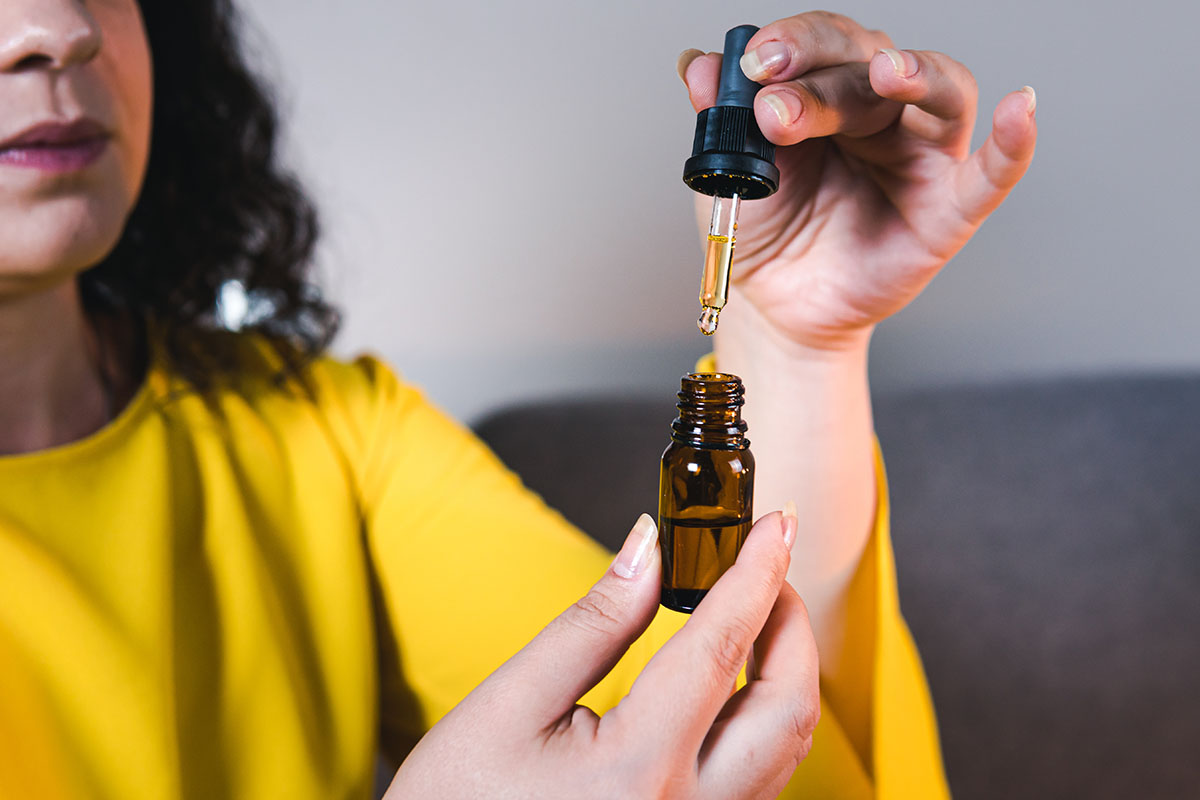
6 Reasons Why CBD May Not Be Working For You
WRITTEN BY KIMBERLY MA AND DR. SWATHI
CBD 101
The endocannabinoid system (also known as the ECS) is a network of receptors within our bodies that respond to the endocannabinoids it naturally makes. In addition to endocannabinoids, receptors are also capable of responding to cannabinoids that are made outside of the body. CBD, for example, is a cannabinoid compound that is derived from the cannabis plant.
In general, the endocannabinoid system plays a pivotal role in the regulation of many normal physiological processes. These may include our bodies ability to regulate healthy inflammation, sleep, mood, appetite, immune function, attention, and emotional processing. Therefore, CBD has been widely used as a supplement to help remedy bothersome symptoms associated with these processes.
Although many people swear by CBD as a staple in their health and wellness regimen, not everyone has experienced the full therapeutic potential of CBD products. However, there are many different underlying reasons this may be the case. Factors such as the degree of functionality of the endocannabinoid system, which is referred to as “endocannabinoid tone,” can vary greatly from person to person; this may result in variable responses as well. Below, we are going to discuss five major reasons CBD may not be working for you in addition to discussing remedies for the potential issues.
Maybe It’s the Wrong Dose
If you are trying CBD products for the first time, start with a low to modest dose. If you are tolerating it well, you can try to increase the dose slowly over a period of at least 2 weeks. It may be tempting to increase the dose at a faster interval, but a slow titration reduces the possibility of possible negative side effects.
Maybe You’re Not Taking It Long Enough
Don’t feel frustrated if CBD doesn’t work immediately. In fact, it's quite common not to experience the full therapeutic efficacy for at least a couple of weeks up to a couple of months. Furthermore, if you are not routinely taking it, this may also contribute to a lack of changes. If you are still not experiencing any effect from the CBD product and are tolerating it well after a week or two, consider increasing the dose in small increments as suggested above.
Maybe You’re Not Taking It Correctly
CBD is also available in a lot of different delivery forms including tinctures, topical creams or lotions, oils, capsules, smoke vapor, and edible treats. Each delivery form varies in the amount of CBD that is absorbed into the body. Also known as bioavailable, the absorption ability is an important parameter that can impact the effectiveness of the product. In general, CBD has a relatively low bioavailability and therefore relies on its delivery systems to improve the amount that reaches our circulation. For example, oil drops or tinctures should be taken sublingually or just under the tongue. The benefits of this delivery system is that it is absorbed rapidly into the circulation. Softgels or other oral forms absorb more slowly and may require consumption with higher fat foods (like coconut milk, nut butter, or avocado).
Maybe It’s the Wrong Product
It may be somewhat confusing, but there are actually a couple different subtypes of CBD products. Several compounds can be derived from the cannabis plant including CBD, THC (primarily known for its psychoactive / intoxicating effects), and others. Understanding the availability of products and which active compounds they contain may be useful for determining which is best suited for your therapeutic needs.
- Full-Spectrum CBD: contains hemp extract that consists of both CBD and other naturally present compounds from the hemp plant including terpenes (aromatic compounds) and small amounts of THC (less than 0.3%–to be specific. Full-Spectrum products are particularly efficacious as producing something called the “entourage effect,” which refers to how all the individual compounds found in hemp extract work better together than how they would if they were used individually.
- Broad Spectrum CBD: similar to full-spectrum products, broad spectrum products contain a mix of compounds that are derived from the hemp extract. The major difference is that broad spectrum products produce the “entourage effect” with 0%THC. Broad Spectrum products undergo additional extraction processes to remove all traces of THC, so you can be assured these products won’t stimulate any of the negative effects associated with it.
- CBD isolate: like it sounds, contains pure CBD. All other compounds have been carefully extracted out of the finished form.
At Element Apothec, we believe that Broad Spectrum CBD is a great choice for most people. Click here to learn more about why Broad Spectrum hemp extract is used in our products.
Maybe It’s Not A High Quality Product
Not all CBD is created equal. Unfortunately, the increasing popularity and availability of CBD products has been met with an equal increase of lower quality CBD products on the market. While it can be tempting to reach for products that are more affordable, it’s important to do some research on the company’s sourcing and quality of their natural products. Opt for options that are grown locally in the US, as cultivation requires heavy regulations on soil purity and the use of pesticides. Furthermore, established brands with transparent policies usually provide more detailed information on their processing methods. Learn more about our commitment to clean products and transparency at Element Apothec.
Maybe It’s Not the Product, It’s Your Genetics–And That’s Okay!
The endocannabinoid system contains a number of different receptors, transporters, and degrading enzymes that help to carry out responses within the body. Alterations to genes that encode for these different components within the endocannabinoid system, can result in alterations in the way that our body tolerates and responds to compounds like CBD. However, it’s important to note that variations in genetics can have effects that both increase or decrease the effect of CDB. Therefore, it is important to play around with different doses and products to see what will work best for you while minimizing side effects. If you are still having trouble, do not fret! Genetic testing and genetic testing kits for cannabis products are available as well.
Conclusion
CBD is a great well-rounded natural product that has a number of uses including benefiting sleep issues, anxious feelings, discomfort, inflammation, and more. However, the reality is that it does not work for everyone. Some individuals naturally produce high levels of endocannabinoids within their body and therefore are not very responsive to taking it. Others may have differences in preferences or genetics. Either way, if you have given CBD a “fair try,” fret not! There are many other natural products that may work better for you. To wrap it all up, don’t sweat it if you feel like your CBD is not working. It is very common that individuals require some trial and error before they find a regimen that works well for them. The major takeaways include:
- Do some research on the brand and sourcing of the CBD products you purchase
- Try increasing the dose or practice good adherence for a couple weeks before re-evaluating
- Swap out of the delivery system of CBD to fit your needs and preferences
- You don’t need to figure it out on your own–schedule a time to chat with our medical team!
References
- MacCallum CA, Russo EB. Practical considerations in medical cannabis administration and dosing. Eur J Intern Med. 2018;49:12-19. doi:10.1016/j.ejim.2018.01.004
- Iffland K, Grotenhermen F. An Update on Safety and Side Effects of Cannabidiol: A Review of Clinical Data and Relevant Animal Studies. Cannabis Cannabinoid Res. 2017;2(1):139-154. Published 2017 Jun 1. doi:10.1089/can.2016.0034
- Sulak D. Top 5 reasons why CBD isn't working for you. Healer. https://healer.com/blog/top-5-reasons-why-cbd-isnt-working-for-you/. Published July 6, 2022. Accessed January 27, 2023.
- Pagano C, Navarra G, Coppola L, Avilia G, Bifulco M, Laezza C. Cannabinoids: Therapeutic Use in Clinical Practice. Int J Mol Sci. 2022;23(6):3344. Published 2022 Mar 19. doi:10.3390/ijms23063344
- Hryhorowicz S, Walczak M, Zakerska-Banaszak O, Słomski R, Skrzypczak-Zielińska M. Pharmacogenetics of Cannabinoids. Eur J Drug Metab Pharmacokinet. 2018;43(1):1-12. doi:10.1007/s13318-017-0416-z
–
This article was edited by Dr. Swathi and was written by Element Apothec Scientific Communications Intern, Kimberly Ma. She is a Doctor of Pharmacy (PharmD) candidate at the University of Connecticut School of Pharmacy in Storrs, Connecticut.











